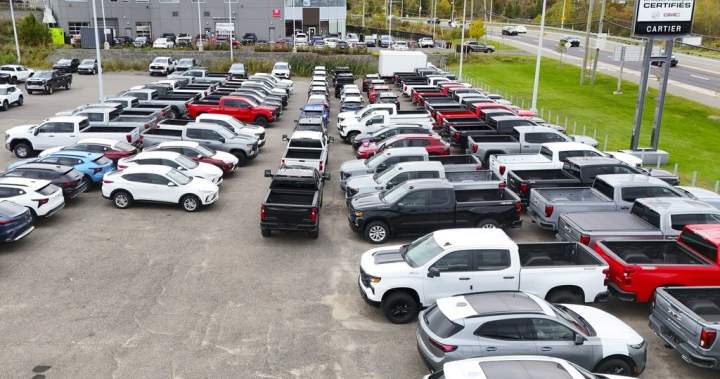Instructions:
Want to discuss? Please read our Commenting Policy first.
If you get Global News from Instagram or Facebook – that will be changing. Find out how you can still connect with us.
More Canadians are getting into a new vehicle, according to new data, but fewer sales are for zero-emissions vehicle (ZEV) options like electric vehicles.
This comes as the trade war and tariff policies from United States President Donald Trump continue to evolve, and as the Liberal government said it is rethinking its approach to electric vehicle sales mandates.
Tariffs have had a significant impact on the auto sector in particular, and consumers have been pulling back on spending as higher costs and economic uncertainty weigh on affordability.
Statistics Canada reported on Monday that in July of 2025 there were 179,814 new vehicles sold, which was up slightly from 177,313 in June.
Compared to last year, July’s reading marked a 6.8-per cent increase from July of 2024, and compares with a 6.2-per cent increase in June compared to a year prior.
Of the new vehicles sold in July of 2025, passenger vehicle sales were up more than 11 per cent, and those of trucks were up more than six per cent.
In the same month there were 13,920 new vehicles sold that were classified as ZEVs, and that was down 33.7 per cent compared to one year earlier. Those new electric vehicles made up 7.7 per cent of all new vehicles sold in July compared to 7.9 per cent in June’s report.
Prime Minister Mark Carney announced on Sept. 5 that the federal government is launching a 60-day review of the current EV mandate program, which requires car companies to meet sales targets each year until 100 per cent of sales are all zero-emissions vehicles by 2035.
Carney also announced that ahead of the results of the 60-day assessment, the current mandate would be delayed for 2026 model year requirements.
In his announcement, Carney said the decision to temporarily pause the mandates were to provide the auto sector with “flexibility” as they are already being challenged by additional tariff-induced costs.
Separate consumer reports show some of the main reasons people may not be purchasing electric vehicles is the added cost of ownership for the vehicle and equipment like at-home chargers, in addition to infrastructure challenges including a reliable charging network.
The email you need for the day’s top news stories from Canada and around the world.
The email you need for the day’s top news stories from Canada and around the world.











